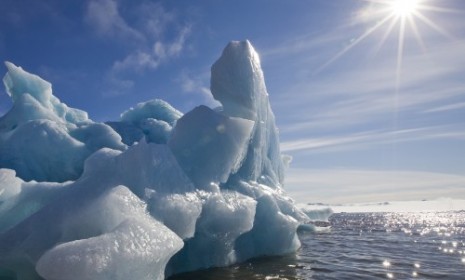Climategate: The truth
German magazine Der Spiegel has carried out an exhaustive study of the thousands of Climategate e-mails — bringing new clarity to the scandal

A free daily email with the biggest news stories of the day – and the best features from TheWeek.com
You are now subscribed
Your newsletter sign-up was successful
Lost amid the clamor of the "Climategate" debate was the fact that few commentators had actually read the 1,000-plus University of East Anglia e-mails leaked online. Now German magazine Der Spiegel has conducted an exhaustive study of the mass of leaked information in a search for "in-depth insight into the mechanisms, fronts and battles within the climate-research community."
Far from providing evidence of a conspiracy, the magazine reports, the e-mails reveal a "bitter and far-reaching trench war" among climate scientists over their complex findings. Caught between a powerful "skeptics lobby" of industrialists who wanted to play down the risks of global warming and a media desperate for doom-mongering predictions, the scientists fought with each other over how to present their evidence — and cover up discrepancies. Here's an excerpt:
"A dangerous dynamic had been set in motion: Any climate researcher who expressed doubts about findings risked playing into the hands of the industrial lobby. The leaked e-mails show how leading scientists reacted to the PR barrage by the so-called 'skeptics lobby.' Out of fear that their opponents could take advantage of ambiguous findings, many researchers tried to simply hide the weaknesses of their findings from the public.
The Week
Escape your echo chamber. Get the facts behind the news, plus analysis from multiple perspectives.

Sign up for The Week's Free Newsletters
From our morning news briefing to a weekly Good News Newsletter, get the best of The Week delivered directly to your inbox.
From our morning news briefing to a weekly Good News Newsletter, get the best of The Week delivered directly to your inbox.
"...Sociologists have [also] identified 'one-up debates' in the media in which darker and darker pictures were painted of the possible consequences of global warming. 'Many journalists don't want to hear about uncertainty in the research findings,' Max Planck Institute researcher Martin Claussen complains.
"...Climatological findings will probably remain ambiguous even if further progress is made. [Science sociologist Peter] Weingart says it's now up to scientists and society to learn to come to terms with this. In particular, he warns, politicians must understand that there is no such thing as clear results. 'Politicians should stop listening to scientists who promise simple answers,' Weingart says."
Read the entire article at Spiegel Online.
A free daily email with the biggest news stories of the day – and the best features from TheWeek.com
-
 Why is the Trump administration talking about ‘Western civilization’?
Why is the Trump administration talking about ‘Western civilization’?Talking Points Rubio says Europe, US bonded by religion and ancestry
-
 Quentin Deranque: a student’s death energizes the French far right
Quentin Deranque: a student’s death energizes the French far rightIN THE SPOTLIGHT Reactions to the violent killing of an ultraconservative activist offer a glimpse at the culture wars roiling France ahead of next year’s elections
-
 Secured vs. unsecured loans: how do they differ and which is better?
Secured vs. unsecured loans: how do they differ and which is better?the explainer They are distinguished by the level of risk and the inclusion of collateral